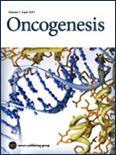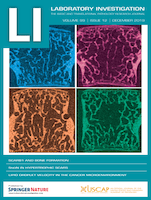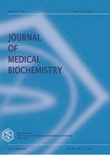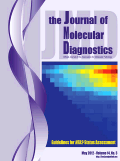
INTERNATIONAL JOURNAL OF BIOLOGICAL MARKERS
Scope & Guideline
Unveiling Insights for Enhanced Patient Care
Introduction
Aims and Scopes
- Diagnostic Biomarkers:
Research dedicated to identifying and validating biomarkers that can effectively diagnose various types of cancers, enhancing early detection and treatment. - Prognostic Indicators:
Studies that explore biomarkers associated with patient prognosis, aiding in predicting disease outcomes and tailoring treatment strategies accordingly. - Molecular Mechanisms:
Investigations into the molecular and genetic pathways involving biomarkers, contributing to a deeper understanding of cancer biology and potential therapeutic targets. - Innovative Methodologies:
Utilization of cutting-edge techniques such as liquid chromatography-mass spectrometry, next-generation sequencing, and bioinformatics to analyze biomarkers in cancer research. - Clinical Applications:
Research that bridges laboratory findings with clinical applications, focusing on how biomarkers can be integrated into clinical practice for improved patient management.
Trending and Emerging
- Exosomal and Circulating Biomarkers:
There is an increasing focus on the role of exosomes and circulating biomarkers in cancer diagnostics and prognosis, reflecting a shift towards non-invasive techniques for patient evaluation. - Long Non-Coding RNAs (lncRNAs):
Research on the implications of lncRNAs in cancer progression and treatment response is gaining momentum, indicating their potential as novel biomarkers and therapeutic targets. - Immunotherapy and Immune Checkpoint Inhibitors:
With the rise of immunotherapy, studies exploring immune-related biomarkers and their predictive value in immunotherapy response are becoming more prevalent. - Metabolomics and Lipidomics:
Emerging themes in metabolomics and lipidomics are being explored as potential diagnostic tools, illustrating a shift towards understanding the metabolic profiles associated with cancer. - Machine Learning in Biomarker Discovery:
The application of machine learning techniques for biomarker discovery and cancer classification is on the rise, highlighting the integration of technology in enhancing research methodologies.
Declining or Waning
- General Cancer Biomarkers:
There is a noticeable shift away from broad discussions on general cancer biomarkers towards more specific studies that focus on particular cancer types and their unique biomarkers. - Solely Prognostic Studies:
Research that focuses solely on the prognostic implications of biomarkers without integrating diagnostic or therapeutic perspectives is less frequently published, indicating a trend towards more comprehensive studies. - Traditional Diagnostic Methods:
The reliance on traditional diagnostic methods for cancer detection is decreasing, with a growing preference for novel and advanced techniques that utilize biological markers.
Similar Journals

BREAST CANCER RESEARCH
Advancing knowledge in breast cancer research.BREAST CANCER RESEARCH, published by BMC, is a prestigious open-access journal dedicated to advancing the field of oncology with a specific focus on breast cancer. Since its inception in 1999, the journal has established itself as a leading platform for disseminating high-quality research, with an impressive impact factor and recognition in the Q1 category for both Cancer Research and Oncology as of 2023. The journal is ranked 45th out of 404 in the field of Medicine _ Oncology and 37th out of 230 in Biochemistry, Genetics and Molecular Biology _ Cancer Research, placing it in the top echelons of research quality and relevance at 88th and 84th percentiles, respectively. BREAST CANCER RESEARCH is committed to facilitating rapid and open access to groundbreaking findings, making it an invaluable resource for researchers, healthcare professionals, and students striving to enhance their understanding of breast cancer mechanisms, treatments, and prevention strategies. With its base in the United Kingdom, the journal continues to foster international collaborations and discussions aimed at improving patient outcomes and enriching cancer research worldwide.

BRITISH JOURNAL OF CANCER
Elevating the Standards of Cancer Research.The British Journal of Cancer, published by SpringerNature, stands as a preeminent resource in the fields of Cancer Research and Oncology, with a distinguished history of publication dating back to 1947. With its Q1 rank in both categories for 2023, this journal is among the top-tier publications, offering cutting-edge research and insights into the biology, etiology, and treatment of cancer. The journal’s rigorous peer-review process ensures that readers are presented with high-quality studies that contribute to the advancement of cancer knowledge and clinical practice. Operating from the United Kingdom, it has garnered a notable impact factor and ranks impressively within Scopus, making it an essential publication for researchers, healthcare professionals, and students who are dedicated to understanding cancer's complexities. Access to the journal's articles is available in traditional formats, providing a versatile platform for disseminating pivotal research. As we move towards a future where cancer treatment and prevention remain crucial, the British Journal of Cancer continues to play a vital role in shaping the dialogue and discoveries within the oncology community.

PATHOLOGY RESEARCH AND PRACTICE
Advancing the Frontiers of Pathological SciencePATHOLOGY RESEARCH AND PRACTICE is a premier journal in the field of pathology and forensic medicine, published by Elsevier GmbH in Germany. With a rich publication history since 1978 and an impressive convergence period extending to 2024, this journal serves as a vital resource for researchers and professionals dedicated to advancing the understanding of pathological processes. It holds notable rankings, including Q3 in Cell Biology and Q2 in Pathology and Forensic Medicine for 2023, reflecting its significance in the academic community. The journal aims to publish innovative research findings, reviews, and case studies, facilitating a deeper understanding of disease mechanisms and improving diagnostic practices. Authors and readers alike benefit from its reputable platform, noted for its challenging and rigorous peer-review process. By fostering a collaborative environment and providing open access options, PATHOLOGY RESEARCH AND PRACTICE continues to contribute meaningfully to the discourse within its respective fields, thereby appealing to a diverse audience of researchers, professionals, and students.

Oncogenesis
Unlocking the molecular secrets of oncogenesis.Oncogenesis is a prestigious open access journal, published by SpringerNature, dedicated to advancing our understanding of cancer biology and molecular mechanisms of oncogenesis. Since its inception in 2012, this journal has quickly established itself as a leading platform for innovative research, being ranked in the Q1 quartile in both Cancer Research and Molecular Biology categories for 2023. With an admirable impact factor that reflects its exceptional quality, Oncogenesis is indexed in Scopus, holding notable rankings in both Molecular Biology and Cancer Research, placing in the 87th and 83rd percentile respectively. The journal not only facilitates the dissemination of groundbreaking research but also encourages collaboration among scientists and healthcare professionals across the globe. By offering open access to its articles, Oncogenesis ensures that vital findings reach a diverse audience, fostering a deeper dialogue and understanding in the fight against cancer. Based in the United States but with a global reach, the journal remains committed to publishing high-impact studies that contribute to the advancement of knowledge in the realms of oncology, biochemistry, and genetics.

LABORATORY INVESTIGATION
Enriching Knowledge in Pathology and Forensic MedicineLaboratory Investigation is a premier academic journal published by Elsevier Science Inc, specializing in the fields of Pathology, Forensic Medicine, Cell Biology, and Molecular Biology. With its ISSN 0023-6837 and E-ISSN 1530-0307, this journal has been a significant contributor to scientific discourse since its inception in 1952, converging into its current form by 2024. It holds an impressive standing in its respective fields, featuring a 2023 Journal Rank of Q2 in both Cell Biology and Molecular Biology, and an elite Q1 ranking in Pathology and Forensic Medicine, reflecting its influence and quality of research, as seen in its Scopus ranks—17th out of 208 in Pathology and Forensic Medicine. Although it does not offer Open Access options, the journal remains a vital resource for researchers, professionals, and students who seek to disseminate and engage with high-caliber research findings. The importance of Laboratory Investigation is underscored by its commitment to advancing the understanding of laboratory and translational medicine, paving the way for innovations that enhance clinical practices.

Journal of Medical Biochemistry
Empowering Discoveries in Medical BiochemistryJournal of Medical Biochemistry is a distinguished peer-reviewed journal published by the SOC MEDICAL BIOCHEMISTS SERBIA, focusing on the significant intersection of biochemistry and medicine. With an e-ISSN of 1452-8266, this Open Access journal has been enriching the academic community since 2007, providing vital insights and research findings that advance the field of medical biochemistry. Based in Belgrade, Serbia, the journal plays a pivotal role in disseminating contemporary research, highlighted by its impressive standings in the 2023 quartile rankings, featuring Q2 in Medical Biochemistry and Q3 in Clinical Biochemistry. The journal is recognized in Scopus with rankings that position it within the discerning area of medical biochemistry and clinical biochemistry, attesting to its influence and relevance. By promoting innovative research and facilitating an open exchange of scientific ideas, the Journal of Medical Biochemistry is a crucial resource for researchers, professionals, and students dedicated to uncovering the biochemical underpinnings essential to improving human health.

Journal of Pathology Clinical Research
Championing Open Access to Pathological KnowledgeThe Journal of Pathology Clinical Research is a prestigious academic platform published by WILEY, dedicated to advancing the field of pathology and forensic medicine. Since its inception in 2015, this Open Access journal has championed the dissemination of cutting-edge research relevant to both clinical practice and laboratory science, allowing for greater visibility and accessibility to researchers, professionals, and students worldwide. With a robust Q1 ranking in the Pathology and Forensic Medicine category for 2023, it stands as a critical resource for those seeking to stay at the forefront of the field, currently positioned at rank #29 out of 208 according to Scopus metrics, placing it in the 86th percentile. The journal's commitment to high-quality peer-reviewed articles fosters an environment of scholarly exchange that is essential for innovation and professional growth in pathology and forensic studies. Researchers and practitioners alike are encouraged to contribute and engage with a community dedicated to excellence in clinical research.

IN VIVO
Elevating biochemistry and molecular biology to new heights.IN VIVO is a prestigious academic journal published by the International Institute of Anticancer Research, dedicated to advancing the fields of biochemistry, genetics, molecular biology, cancer research, and pharmacology. With its ISSN 0258-851X and E-ISSN 1791-7549, this journal has been a key contributor to innovative research since its inception in 1987, providing a crucial platform for the dissemination of significant findings in its scope. With an impressive impact reflected in its quartile rankings (Q2 in Biochemistry, Genetics and Molecular Biology and Medicine; Q3 in Cancer Research and Pharmacology), IN VIVO reaches a global audience comprising researchers, health professionals, and students. Although it operates on a subscription basis, the journal’s commitment to scientific excellence and rigorous peer review ensures that all published works maintain high quality and relevance. Notably positioned in Scopus ranks within the 36th to 59th percentiles across various categories, IN VIVO continues to be a vital resource for cutting-edge research and developments, solidifying its importance within the scientific community.

Malaysian Journal of Pathology
Advancing knowledge in pathology and medicine.Malaysian Journal of Pathology, published by the MALAYSIAN JOURNAL PATHOLOGY, stands as a pivotal resource in the fields of pathology and medicine, contributing rich insights since its inception in 1979. This peer-reviewed journal, based in Malaysia, is dedicated to disseminating original research, review articles, and case studies that advance the understanding of disease mechanisms and diagnostics. With a current impact factor reflecting its ranked positioning—Q4 in Cell Biology, Q4 in Histology, and Q3 in both Miscellaneous Medicine and Pathology & Forensic Medicine—this journal serves as an essential platform for researchers, clinicians, and students alike. Although it operates without open access, its scholarly rigor and contributions are well recognized, holding ranks such as #84 in Pathology and Forensic Medicine according to Scopus. The Malaysian Journal of Pathology is committed to fostering innovation and excellence in medical research, making it an invaluable tool for professionals seeking to stay abreast of significant advancements in the pathology domain.

JOURNAL OF MOLECULAR DIAGNOSTICS
Elevating the standards of diagnostic excellence in healthcare.The Journal of Molecular Diagnostics is a premier publication in the fields of molecular medicine and pathology, published by Elsevier Science Inc. With an impressive impact factor and recognized as a Q1 journal in both Molecular Medicine and Pathology and Forensic Medicine, this journal is dedicated to advancing the understanding and application of molecular diagnostics in clinical practice. The journal features rigorous peer-reviewed research, comprehensive reviews, and cutting-edge methodologies that highlight novel diagnostic tests and biomarkers. Researchers, professionals, and students in the biomedical sciences are invited to explore its diverse array of articles and contribute to a growing body of knowledge critical for innovation in healthcare delivery. Located in the Netherlands, the journal has secure its position among the top-tier journals with its recent Scopus ranking of 20th out of 208 in Medicine Pathology and Forensic Medicine, reflecting a strong percentile ranking of 90th. With coverage spanning from 1999 to 2024, the Journal of Molecular Diagnostics remains a vital resource for anyone committed to the future of molecular research and diagnostics.